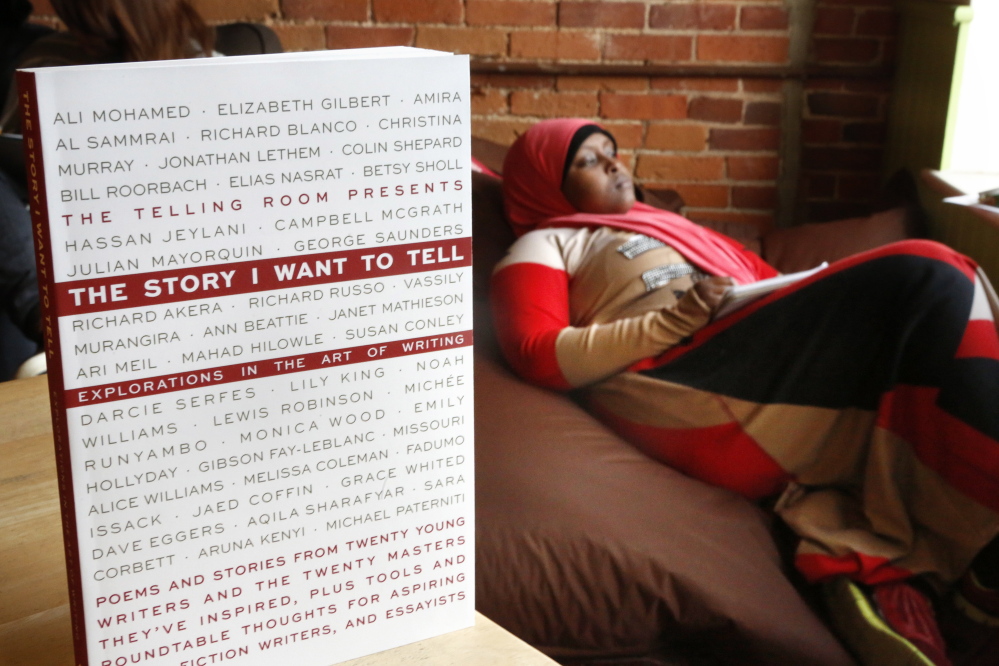Richard Russo was hooked the moment he read about the young boy taking a rock and crushing the dog’s skull.
The dog had just attacked the boy’s younger brother, leaving him bloodied and torn in a Ugandan refugee camp. The enraged older boy, who was just 13 himself, chased the dog, cornering it in a stand of banana plants.
He struck it in the head with a rock. He delivered another blow and another, until he was certain the dog was dead.
“I wanted to cut its head off to make sure it was really dead. Like dead-dead,” Richard Akera wrote in his short story, “I Started to Explain.”
As he read those words, Russo, who won a Pulitzer Prize for fiction in 2002 for “Empire Falls,” understood he was reading more than an account of a vicious, violent attack. He was reading about a boy becoming a man.
“That boy becomes an adult right there in the span of a few seconds, as his rage takes over his entire spirit,” Russo said, seated next to Akera at The Telling Room in Portland. “I was so moved by the way this boy’s innocence was stolen from him in a heartbeat.”
Akera’s story and the one it inspired Russo to write are part of an anthology of writing celebrating the 10th anniversary of The Telling Room, a Portland writing center. “The Story I Want To Tell: Explorations in the Art of Writing” includes 20 stories by Telling Room students and 20 responses by professional writers who have volunteered as mentors.
The Telling Room celebrates the book’s release from 6 to 8 p.m. Wednesday at Space Gallery in Portland.
Published by Maine-based Tilbury House, “The Story I Want to Tell” represents the mission and spirit of The Telling Room. The center aims to foster confidence, creativity and self-expression in young people, from elementary-school age through high school. Generally, it focuses on immigrant students, who use their writing skills to improve their language and communication, although The Telling Room is open to anyone.
In a casual setting that rewards honesty, the center helps young people tell their stories, said Molly McGrath, director of publications for The Telling Room. They gather after school in a bright classroom above Commercial Street in Portland, talking among themselves and writing quietly – or sometimes noisily – on computers and in notebooks.
The center serves thousands of students in 50 schools across 20 towns in Maine.
It was founded by three writing friends: Susan Conley and the husband-and-wife team of Sara Corbett and Mike Paterniti. All three have traveled internationally to find their stories and realized that many of the most compelling stories were right in Portland.
The Telling Room has a staff of five, and benefits from Maine’s rich writing community. Many of the state’s most widely known writers volunteer.
Among the professional writers who contributed to “The Story I Want to Tell” are Elizabeth Gilbert, Jonathan Lethem, Ann Beattie, Richard Blanco, Lily King and Bill Roorbach.
And of course there’s Russo, the writer from Camden whose history with The Telling Room dates back several years. His commitment is based on the writing center’s ability to get young people, particularly immigrants, to open up.
We cannot hear their stories and learn from their experiences unless we convince them their voice is important and should be heard, he said.
“I think most young people don’t realize they have a story to tell, and I think that’s particularly true of kids who come from other cultures or kids who do not have any money or privilege in their background,” Russo said. “The world sometimes seems designed to make such people feel insignificant, when in fact they have some of the most important stories to tell. These are stories the rest of the world needs to hear.”
McGrath said the book project was an appropriate way for The Telling Room to celebrate its first decade. She has helped publish previous anthologies of student writing.
For this one, she wanted to capture the learning that occurs at The Telling Room by involving the professional writers who volunteer as mentors.
The book is available commercially at local booksellers, and The Telling Room also is making it available to schools in hopes that it will become a teaching tool for writing instructors. The Telling Room chose to publish through Tilbury House in part because the publisher reaches the educational as well as the trade market.
INTO THE SCHOOLS
The Telling Room has already made inroads in Maine’s school community. In addition to working with students across the state, it received an Imagination Intensive Community grant from the Maine Alliance for Arts Education for its unorthodox and effective approach to teaching writing.
“The Telling Room has evolved into a community that reaches beyond its own doors to collaborate with a wide variety of local and regional partners, including a number of schools and districts, Portland Public Library, Portland Ovations, and artist educators,” the Maine Alliance for Arts Education wrote in its grant announcement. “The Telling Room builds confidence, provides real audiences for students’ stories, and strengthens literacy skills.”
For “The Story I Want to Tell,” McGrath gave the mentoring writers several stories by different students and asked each to pick a story that inspired a response.
Russo chose Akera’s story because of its emotional drama. The scene at the refugee camp with the boys and the dog was gripping.
His response took the form of a screenplay, beginning with the sound of a young boy screaming as the dog mauls his face. He chose a screenplay “because that’s the way his piece felt to me.”
“I think it had something to do with how compressed it was in terms of time,” he said. “It all happens at once, in that moment. I’m not sure Richard realized how dramatic that his writing was.”
Akera, 21, graduated from Portland High School in 2013. He is now taking classes at Southern Maine Community College, and is considering studying to become an athletic trainer.
SO HIS BROTHER WILL KNOW
He wrote the story during his senior year of high school. What he described in the story is true, he said.
He wrote it “so that in the future my brother knows what happened. I have stories to tell, and I just want to write stories about my family and friends and what I have been through.”
Akera, whose friends call him “AK,” came to the United States from Uganda in 2011. He settled first in Colorado, then came to Maine.
Several friends told him about The Telling Room as a way to improve his English. He joined in 2012 and “just started writing. I really got into it.”
He didn’t know anything about Russo before being paired with him.
He has since read some of Russo’s books, including, most recently, the novel “The Bridge of Sighs.”
“He’s pretty good,” Akera said, laughing at the understatement.
Copy the Story LinkSend questions/comments to the editors.






Success. Please wait for the page to reload. If the page does not reload within 5 seconds, please refresh the page.
Enter your email and password to access comments.
Hi, to comment on stories you must . This profile is in addition to your subscription and website login.
Already have a commenting profile? .
Invalid username/password.
Please check your email to confirm and complete your registration.
Only subscribers are eligible to post comments. Please subscribe or login first for digital access. Here’s why.
Use the form below to reset your password. When you've submitted your account email, we will send an email with a reset code.